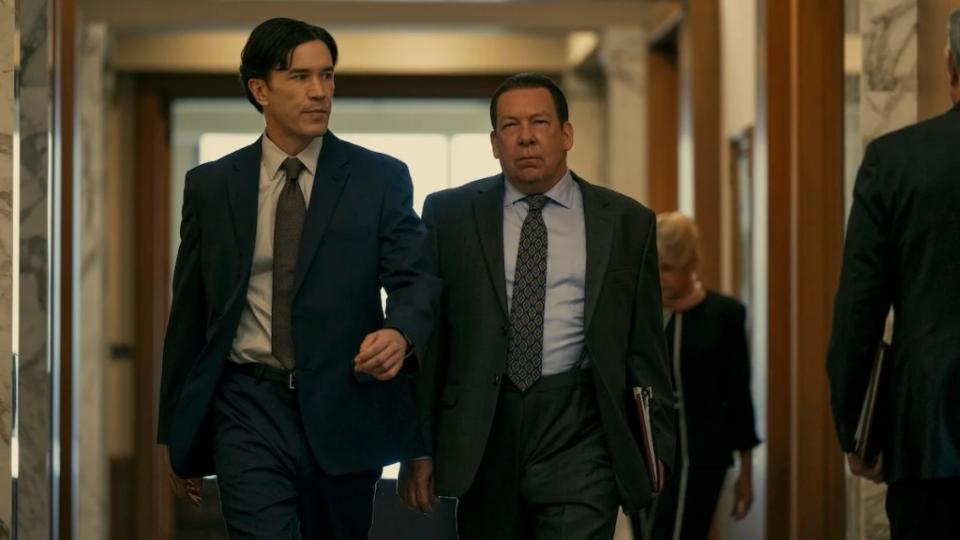‘A Man in Full’ Review: Jeff Daniels Plays a Real Estate Tycoon in Scattered Netflix Series
The late Tom Wolfe wrote sprawling, overstuffed, zeitgeisty novels that always threatened to (and sometimes did) spin out of control. To read “The Bonfire of the Vanities,” “A Man in Full,” or even a lesser work like “I Am Charlotte Simmons,” is to take a long road trip through American hubris and excess, including the author’s own. But the experience is usually breezy, and generally feels like when there’s something good on the car radio.
“A Man in Full” is now a Netflix limited series, its 742 pages pared down to six episodes adding up to less than six hours. Created by David E. Kelley, well-practiced at cutting to the glib quick of things, it provokes a question rare for a format known for bloat: Where’s the rest? The heart of the story, about an Atlanta real estate tycoon (Jeff Daniels, getting his Bubba on) trying to stave off financial ruin and rapacious enemies, is intact — but the saga is rendered as a sprint, not a modern epic.
The series makes gestures toward the novel’s combustible racial strife and sense of society teetering toward chaos, but subplots are thinned out to the point where they barely seem to matter, and most of the relationships between characters lack compelling motive. It’s as if Kelley and his team took a look at the behemoth source material, blinked and got to streamlining. Or maybe they looked at Brian De Palma’s 1990 film adaptation of “Bonfire,” a movie so misbegotten that a book about its making (Julie Salamon’s “The Devil’s Candy”) became a bestselling cautionary tale, and decided they’d better get this over with quickly.

Not that “A Man in Full” is an unmitigated disaster. The series is stocked with strong (and well-directed) performances, including Daniels as Charlie Croker, an arrogant former Georgia Tech football star used to taking what he wants and worrying about the consequences later. As the series begins, those consequences begin to unfold. A sniveling banker (Tom Pelphrey), who claims to have been too often trampled by Charlie, sets out to ruin him by making his exorbitant debts due immediately. Backed by a fearsome colleague (Bill Camp) with an ego as big as Charlie’s, Pelphrey’s Raymond Peepgrass — the very name suggests impotence — goes scorched earth on his nemesis, sneering through Charlie’s slow-drip financial ruin and even wooing the man’s ex-wife, Martha (Diane Lane, doing her best with one of the series’ many underwritten roles).
But wait, there’s more (of course there is; it’s Wolfe). Charlie’s lawyer/fixer, Roger White (Aml Ameen), has an in with the mayor (William Jackson Harper), a fellow Morehouse College alum, who has a proposition for Charlie. The mayor is in a tightly contested race with a racist candidate who shared a college backfield with Charlie and who might have also raped Martha’s friend, Joyce (Lucy Liu). Would Charlie be willing to rat out his old teammate in exchange for some political pressure on the bank that has Charlie by the short hairs? Yes, he might. Meanwhile, Roger’s heart is with another case. Conrad (Jon Michael Hill), the husband of Charlie’s secretary, is in jail for punching a cop in self-defense, and he is not cut out for doing time. Facing off against a headstrong judge (Anthony Heald), Roger digs deep into his legal bag in a storyline that feels like it belongs in another series (perhaps also created by legal eagle Kelley).
“The Wire” famously taught us that all the pieces matter. In “A Man in Full,” the pieces feel scattered and mismatched in a series that moves too quickly to tie them together in any resonant way. You can’t, of course, adapt any novel, much less one of this scope, without making concessions to time, narrative flow and any number of other factors. The problem here is that the concessions are made with little regard for the shape of the series, or for what these characters really mean to each other. Peepgrass both hates and admires Charlie, feelings that are explained in only the most generic terms. Charlie’s second wife, Serena (Sarah Jones), is derided as a trophy wife, and the series does so little with her that it’s difficult to see her as anything but. The series is also drained of much of the racial tension that seethes through the novel, which begins with fears of race riots when a star Black athlete is accused of raping a white heiress. The makers of “A Man in Full” seem bent on not offending anyone too much, an approach antithetical to Wolfe’s writing. What we see onscreen is too often soft, squishy and vague.

But it can also be quite engaging on a scene-to-scene basis, as long as you don’t care much about the big picture. I couldn’t take my eyes off of Camp, a top-flight character actor who fills the screen in every sense. Bulked up to intimidating proportions, he snarls and spits venom and profanity at the usually in-charge Charlie, expressing a brand of malevolence that wouldn’t be misplaced in a Shakespeare villain. When Camp lets loose it barely matters that we know almost nothing about his character or why he’s so intent to destroy Charlie. Harper is also excellent as the opportunistic mayor, slick and whippet-quick, creating a sense of realpolitik almost entirely on the strength of his performance.
But overall the series feels too skinny, like a story reduced to its greatest hits at the expense of connective tissue and world-building. There is little sense of consequence here, little motivation to invest in any of the antagonists. Little to make “A Man in Full” feel full enough.
“A Man in Full” premieres Thursday, May 2, on Netflix.
The post ‘A Man in Full’ Review: Jeff Daniels Plays a Real Estate Tycoon in Scattered Netflix Series appeared first on TheWrap.

 Yahoo News
Yahoo News 
